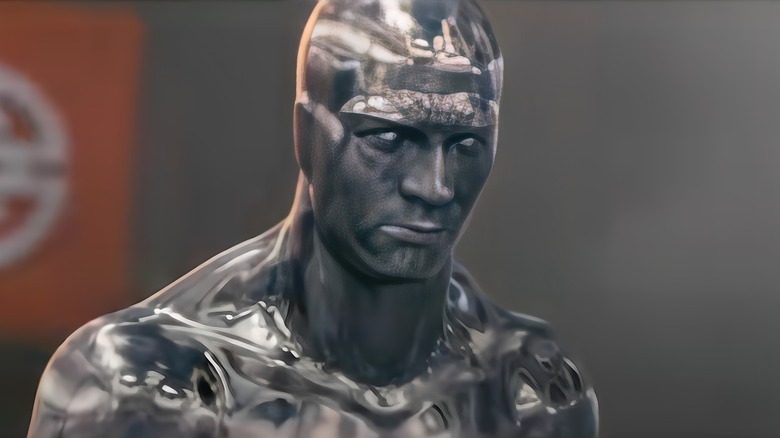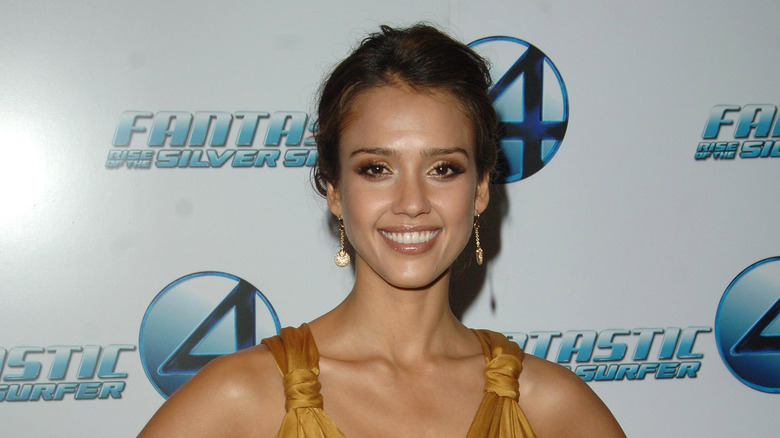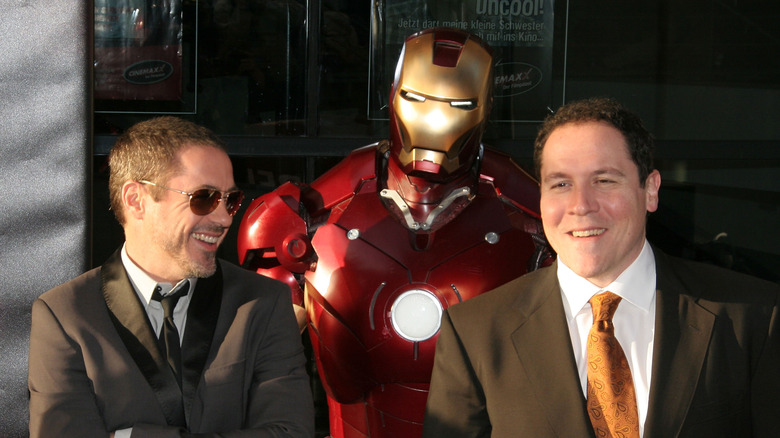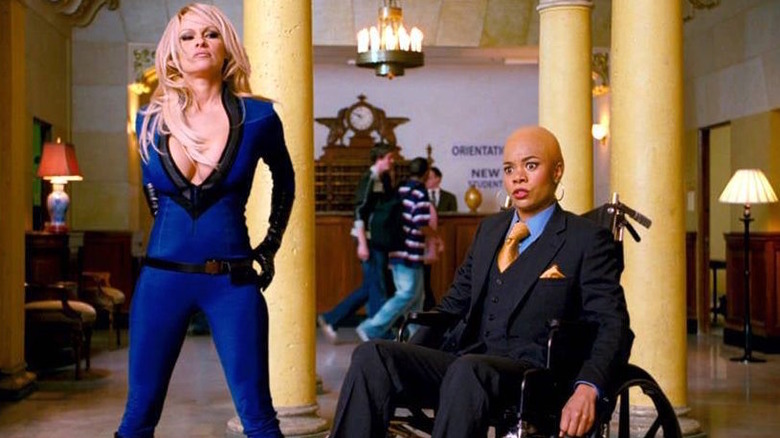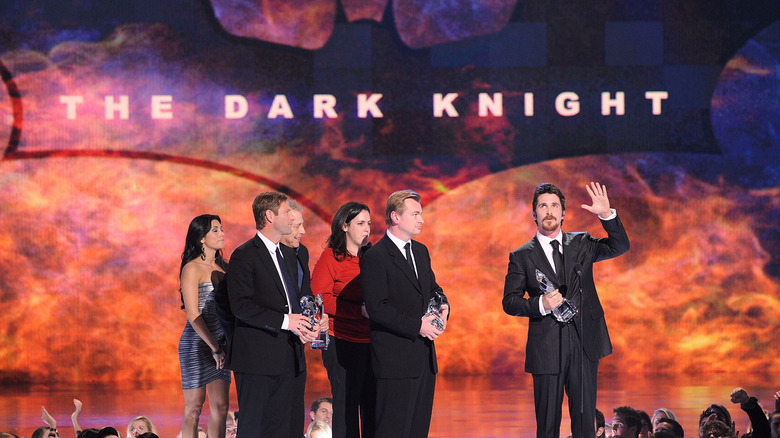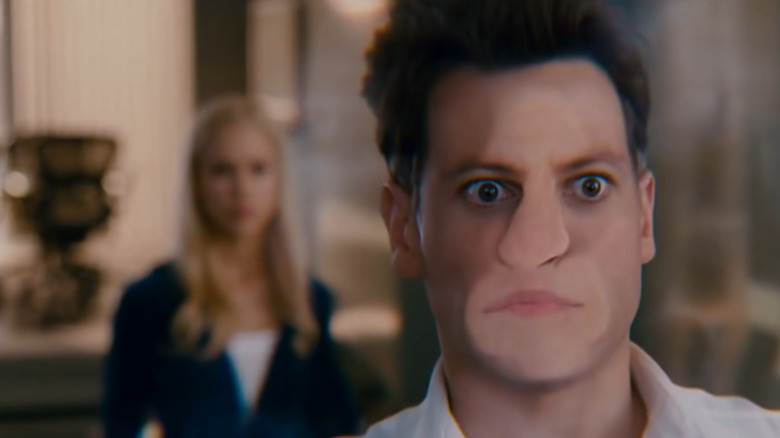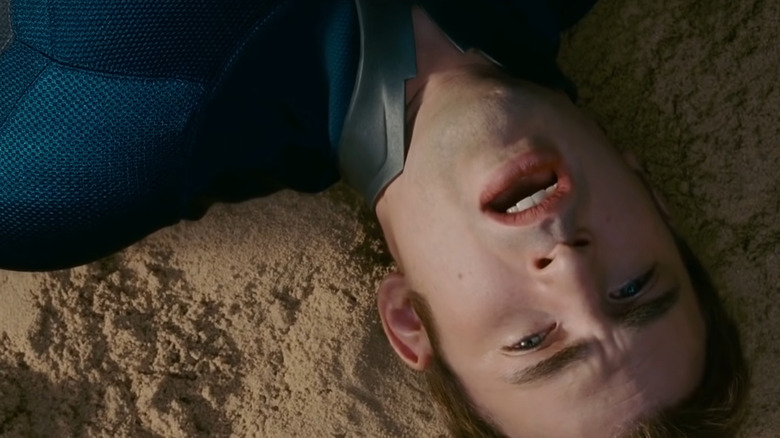Fantastic Four 3: What Killed The Sequel To Rise Of The Silver Surfer
As the Marvel Cinematic Universe circles its new "Fantastic Four" cast, it's worth taking a look at how the first major iteration of the franchise disappeared over a decade ago.
Back in the early 2000s, future Marvel Studios founder and godfather of the modern superhero film Avi Arad sought to repeat his recent successes in the launching of the "Blade," "X-Men," and "Spider-Man" franchises. Setting his sights on Marvel's First Family, he brought in Tim Story (of "Taxi" fame) to helm 2005's "Fantastic Four," believing the promising -– if arguably under-qualified – -director could use Arad's access to previous script drafts, Marvel comics experts, and A-List talent to deliver another blockbuster franchise.
Despite a poor critical reception, Story's "Fantastic Four" was a modest box-office success, grossing over $330 million against a budget of around $100 million. Story, who had ideas for three sequels, got a crack at one of them: 2007's "Fantastic Four: Rise of the Silver Surfer." While it premiered to slightly stronger ticket sales and reviews than its predecessor, the sequel suffered tremendous drop-offs in subsequent weeks, resulting in a lower global gross against a significantly higher budget.
The diminishing box office returns were almost certainly the heart of the demise of any "Fantastic Four 3" plans, though no official account of the film's cancellation exists to confirm as much. Especially as Arad began to shift his attention to Marvel Studios and their groundbreaking sleeper hit "Iron Man" in 2008, producing another Marvel film in a series that was already failing to hold audience interest likely seemed like a waste of time and resources.
The cast tried to hold out hope for the future
Though the "Fantastic Four" series had failed to keep pace with its fellow Marvel properties at the box office, the cast tried to keep hopes high — at least for a few days.
Human Torch actor (and future MCU star) Chris Evans saw the writing on the wall almost immediately. He told MTV, "After the first ["Fantastic Four"] was released we got wind of potential titles and plots [almost immediately], and I've heard nothing from anyone at Fox ... We had all planned on doing ["Fantastic Four 3"] but if there were going to be a third I think a week after the second one was released we would have heard." Co-star Jessica Alba was seemingly more optimistic, even telling MTV several months after the release of "Rise of the Silver Surfer" that she thought the potential sequel should explore Reed Richards (Ioan Gruffud) and Sue Storm's (Alba) pregnancy. This would supposedly also set up the introduction of a teenage Franklin Richards (the duo's popular mutant son from the comics) in a hypothetical fourth film.
For his part, Tim Story also had plans for at least three sequels to the original. He was briefly involved in the J. Michael Straczynski "Silver Surfer" spin-off project lightly teased at the end of the first sequel, and expressed his interest in centering a "Fantastic Four" film on the character of Black Panther — his choice for the role was reportedly "Shazam!" actor Djimon Honsou. None of these aspirations would ultimately materialize, however, as the year 2008 dramatically changed the course of comic book movies forever.
2008 changed superhero films for good
The disappointing box office returns for "Rise of the Silver Surfer" may have been the key reason for 20th Century Studios not moving forward with a third installment, but the year 2008 is arguably what ended the conversation for good.
Avi Arad is largely responsible for what French film theorist Christian Metz would have called the first "classical age" of the superhero genre, an artistic period in which these films wholly transitioned from the experimental phase, wherein the styles, tones, and narrative conventions of each individual work were stratified to an unrecognizable degree. Richard Donner's "Superman," Tim Burton's "Batman," and "Howard the Duck" have far less in common than, say, "Daredevil," "Catwoman," "X-Men," and even "Batman Begins."
This homogenous period in a genre's life cycle cannot last forever, as audiences begin to become too familiar with the aesthetic and narrative tropes classical films will rely on. The next stage, according to Metz's theory, is parody, which allows the filmmaking to use the audience's familiarity with the genre to their advantage by using them as a comedic shorthand. And what, you might ask, was the first superhero movie to release after "Rise of the Silver Surfer" bombed? "Superhero Movie."
Superhero Movie proved the genre had moved on
"Superhero Movie" was a 2008 superhero parody film originally helmed by "Airplane!" and "The Naked Gun" director David Zucker. Once he dropped out, however, the film was both written and directed by none other than future prestige television darling Craig Mazin (y'know, the guy we have to thank for giving us the best video game adaptation of all time).
It took aim at almost every major classical age superhero film, including Tim Story's "Fantastic Four," "X-Men," and, most prominently, Sam Raimi's "Spider-Man" and "Batman Begins." Though its release was met with lukewarm box office numbers and a dismal critical reception, "Superhero Movie" was — at least subconsciously — able to recognize the end of the superhero genre's classical age and the need for it to evolve past its current state. This was proved almost immediately by the films that rounded out the year, bringing the genre into its next transformative phase far quicker than anyone might have expected.
The biggest superhero successes of the year broke new ground
Once parody lays the tropes of a genre bare for even the casual audience member to recognize, that leads to what Christian Metz called the "deconstruction phase," a period of artistic exploration that sees the genre's conventions deliberately subverted to the point of evolving the work outside of its genre of origin — which is exactly what we saw in the immediate wake of "Superhero Movie."
In May of 2008, just a couple of months afterward, came Marvel Studios' "Iron Man," a surprise critical and commercial smash hit that, among other things, pioneered the way superhero films blended their usual tropes with soft comedic elements. It could even be argued it introduced the concept of serialization to the genre, which would be further solidified in the post-credits scene of "The Incredible Hulk" in June. Next came the Will Smith superhero flick "Hancock" in July, which explored an explicitly adult take on the genre in a more realistic setting, planting the seeds that would eventually grow into more popular films like "Deadpool." And, finally, Christopher Nolan's "The Dark Knight" arrived in theaters later that same month with its mesmerizing combination of caped fare and crime noir.
Save "The Incredible Hulk," these films were each decisive box office successes despite varying somewhat in tone, critical reception, and target audience. This could merely be dismissed as the steady rise of the superhero genre as a reliable box office powerhouse — but these weren't the only superhero films released that year.
Fantastic Four 3 would've been part of a dying movement
There were two other superhero films released in 2008, both of which fell victim to the changing genre tides in different ways.
The first was Guillermo del Toro's "Hellboy: The Golden Army." Some may argue it was a deconstructionist work as well, continuing to bring elements of gothic horror to the superhero genre; others may disagree, seeing these elements as solely aesthetic and having been present in the genre in similar ways since the 1990s at least (see "The Crow," "Spawn," and, most notably, the "Blade" trilogy). The most damning piece of evidence in favor of "Hellboy" falling behind the evolving genre shift would be its box office run. Despite outperforming the first film in its opening week and receiving positive reviews from critics, it faced a brutal 71% drop-off in its second week — courtesy of "The Dark Knight."
The last superhero film released in 2008 was "Punisher: War Zone," a Sony standalone follow-up to the 2004 film "The Punisher." Though it boasted an all-new cast, the film's attempts at genre expansions began and ended with the predictable inclusion of hard action, a genre that has been more or less synonymous with the superhero genre for the entirety of its lifespan. With abysmal reviews and a devastating R-rating, "Punisher: War Zone" bombed hard at the box office, and is the lowest-grossing film based on a Marvel property to this day.
The six superhero films released in 2008 essentially made the "Fantastic Four" series obviously obsolete, and, by extension, probably made the mere idea of a sequel to "Rise of the Silver Surfer" unwise. Perhaps if fans maintained some interest and had box office trends favored classical superhero films, Fox would have considered green-lighting a third film a year or two afterward.
The MCU changed everything
2009 brought just two critically and commercially disappointing superhero films that only further solidified the future of the genre. "X-Men Origins: Wolverine" did little to push the series past its early 2000s beginnings. Zack Snyder's stylish "Watchmen" adaptation, meanwhile, merely pretended at deconstructing the genre the same way its source material did, ultimately relying on the same flashy effects, unrealistic combat, and gratuitous violence one could find in any superhero film from the past decade. Most of what critics found to be subversive could be traced to Alan Moore's original work — and even what little of that was noted seemed diluted in Snyder's translation.
By 2010, Marvel Studios was already quickly defining what audiences would expect from superhero films going forward, subtly stoking their subconscious desire for deconstructionism with films like "Captain America: The Winter Soldier" (spy thriller) and "Guardians of the Galaxy" (cosmic sci-fi/comedy). When classical properties like "X-Men" and "Spider-Man" were revived, they were infused with elements from new genres such as coming-of-age comedies and period pieces — and when James Mangold resurrected Wolverine from his embarrassing "Origins," he did so with the help of the epic samurai and neo-western genres.
Some may feel that the MCU has paved the way for another classical age; some may feel we've entered some post-deconstructionist, entropic phase. In either case, the state of the superhero genre is far different and perhaps more fragile than when "Rise of the Silver Surfer" was released. If Marvel wants the new "Fantastic Four" film to be critically and commercially successful, it will surely need to reflect that.
